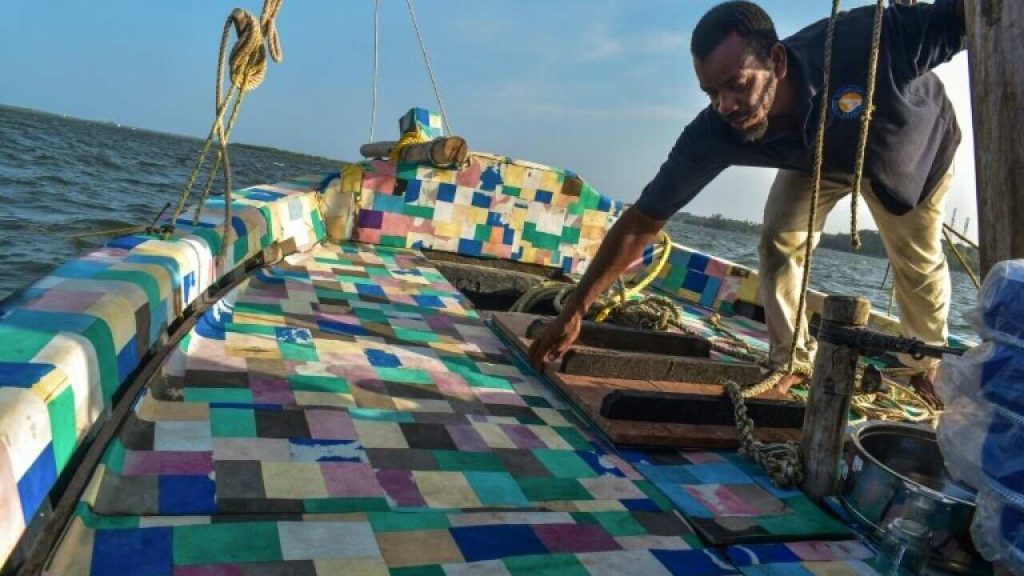The Flipflopi Project, which created the world’s first 100% recyclable plastic sailing dhow, has collaborated with Newcastle University engineering specialists and ePropulsion, the creators of an innovative solar-electric propulsion system, to build and test their most recent breakthrough.
The team has installed an innovative solar-electric engine on Flipflopi’s latest vessel, a boat taxi made completely of recycled plastic gathered and produced on Lamu Island in Northern Kenya, which has now been certified seaworthy.
During a month-long trial ferrying islanders on the solar-powered water taxi, the new eco-friendly system was found to equal the speed of standard petrol engines while costing far less to run and emitting zero emissions.
Dr Simon Benson, project lead at Newcastle University, said the pilot programme showed that electric propulsion is no longer just a climate solution for luxury cars, or for mass transit in high-tech cities.
“It can contribute to solving environmental problems in lower resourced rural communities, too,” he said.
“Since the solar panels can be fully recharged daily, on land and on the boat, this makes it a great option for short transit routes.”
He cited coastal, lakeside and island communities across the world, who use small, open boats with outboard engines for fishing, cargo and passenger transport.
It not only reduces waste otherwise destined for the ocean but also lowers carbon emissions, removes carbon fuel costs impacting local people and reduces local environmental pollution
Judi Wakhungu
FIGHTING POLLUTION
The boat and its solar engine underwent this pilot as part of a broader Sustainable Manufacturing and Environmental Pollution (SMEP) programme.
The initiative is supporting Flipflopi to research community-centred circular solutions, including heritage boatbuilding, to help solve the waste management and plastic pollution problem in peri-urban shoreline communities.
The recycled plastic water taxi was built out of 1.2 tonnes of HDPE plastic that was recovered by the community-centered programme, and would otherwise have been burnt, dumped or destined for the ocean.
The Flipflopi manufactures high-quality plastic lumber at the Lamu-based recovery and recycling centre, which is then hand-crafted using traditional boat-building techniques by local craftsmen combined with new appropriate technology.
Ali Skanda, co-founder of The Flipflopi Project, said their mission is to help solve the plastic pollution crisis by supporting circular solutions in low-income maritime communities.
“With our recycling and heritage boatbuilding centre, we are exploring how to create viable boat prototypes from plastic waste and preserving the indigenous craftsmanship of boatbuilding and furniture making for generations to come,” he said.
“If we can also adopt solar-powered engines, we start to realise even greater opportunities for a greener and more sustainable future.”
The project is part of a wider set of objectives to determine the potential for holistic step-changes in addressing the environmental impact of working boats used in maritime and low-income communities like Lamu.
Former Environment CS Judi Wakhungu, who is a member of the Flipflopi’s Advisory Board, said East Africa has been leading the way on the climate agenda for many years now.
She hailed FlipFlopi for their hands-on localised solutions for mitigating plastic pollution and campaign to ban unnecessary single-use plastics at the regional level.
“Now we have another first in Lamu with this recycled plastic boat powered by solar,” Wakhungu said.
“It not only reduces waste otherwise destined for the ocean but also lowers carbon emissions, removes carbon fuel costs impacting local people and reduces local environmental pollution.”
She said it is a powerful demonstration that lower-resourced communities can lead the world in driving policy agendas and sustainability.
They are innovating by combining low and high technologies, such as artisanal boatbuilding, plastic recycling and renewable energy, she said.
BOAT POTENTIAL
The project’s success demonstrates the potential for artisanal boats made from waste plastics and equipped with electric engines and boat-mounted solar charging systems, paving the way for zero-emission transportation solutions.
The research also highlights the need for improved support systems, such as maintenance and hire-schemes, to help more places adopt this technology, ensuring a greener future for marine transportation.
The solar electric engine project was made possible with the support of maritime engineering experts at Newcastle University led by Dr Simon Benson, with funding from the UK government’s International Science Partnerships Fund.
Flipflopi are supported by the Sustainable Manufacturing and Environmental Pollution (SMEP) Programme, which enabled the design and build of the water taxi itself.
The project was turned to reality through collaborative partnerships with UK based ePropulsion, who supplied the battery-powered engine, and Kenyan based Solagen, who supplied the solar systems.

